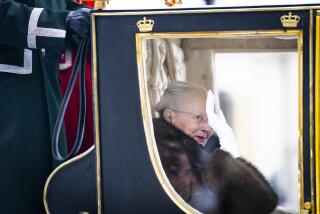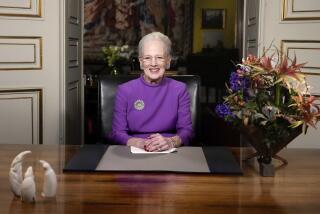Ex-Queen Juliana, 94; Oversaw Dismantling of the Dutch Empire
- Share via
AMSTERDAM — Former Queen Juliana, who presided over the dismantling of the centuries-old Dutch empire and witnessed the birth of a social revolution during her 32-year reign in the Netherlands, died Saturday. She was 94.
Juliana died in her sleep at the royal palace in Soestdijk, about 30 miles southeast of Amsterdam, the government announced. Her doctors said she had died of pneumonia, combined with a general deterioration of health.
“In her we lose a warm and involved woman, a mother to us all,” Prime Minister Jan Peter Balkenende said in a televised address to the nation. “By her own words, if she hadn’t been queen, she would have liked to have been a social worker.”
Balkenende ordered flags on public buildings to be flown at half staff until Juliana’s remains are interred. A date for the funeral was not set.
Princess Juliana gave up the title of queen when she abdicated in favor of her daughter Beatrix in 1980.
The royal palace protected her privacy, but she was known to suffer heart problems and to have been under 24-hour care by two nurses. Her husband, Prince Bernhard, admitted in a televised interview in June 2001 that Juliana could no longer recognize members of her family.
In addition to Bernhard and her daughter Beatrix, Juliana is survived by three other daughters, princesses Irene, Margriet and Christina; 14 grandchildren, including Crown Prince Willem-Alexander; and seven great-grandchildren.
Juliana Louise Emma Marie Wilhelmina was the only child of Queen Wilhelmina and Duke Henry Vladimir Albrecht Ernst of Mecklenburg-Schwerin, later known as Prince Hendrik of the Netherlands. Her birth on April 30, 1909, was widely hailed by the Dutch, who had waited eight years for a successor to the throne. She was 39 when she took the throne on Sept. 4, 1948.
One year into her reign, Juliana oversaw a watershed in Dutch history: the recognition of an independent Indonesia. Her proclamation officially ended 346 years of colonial rule in the former Dutch East Indies, from which great wealth had flowed to the Netherlands for generations.
Through her more modern, down-to-earth ways, she brought the monarchy closer to the people than had her mother, Queen Wilhelmina.
As queen, she was active in social issues, frequently visiting hospitals, old-age homes and nurseries. She spent days in the provinces of Zeeland and South Holland when they were inundated by devastating floods in early 1953.
During the turbulent 1960s, she watched the social unrest among youths that decades later evolved into such landmark legislation as legalization of homosexual marriages, prostitution and euthanasia.
Even after she abdicated, the Dutch continued to celebrate their national holiday on her birthday rather than that of the reigning Queen Beatrix.
More to Read
Sign up for Essential California
The most important California stories and recommendations in your inbox every morning.
You may occasionally receive promotional content from the Los Angeles Times.













